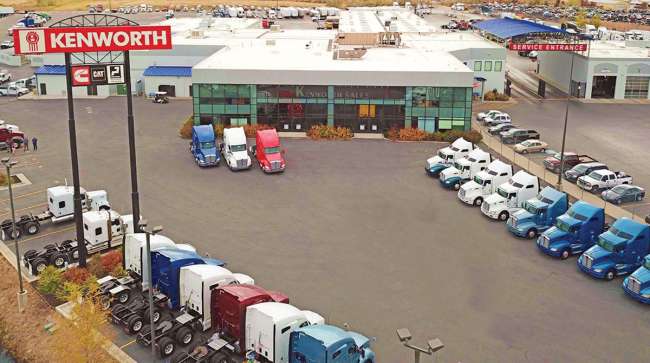New trucks for sale at a Kenworth dealership. (kenworthsalesco.com)
Legislation designed to repeal a World War I-era tax on new heavy-duty trucks, tractors and trailers was recently introduced in the U.S. House of Representatives.
Rep. Doug LaMalfa (R-Calif.), a senior member of the Transportation and Infrastructure Committee, has renewed an effort to repeal this 12% federal excise tax on certain commercial vehicles. Commonly referred to as the Modern, Clean and Safe Trucks Act, the bill’s reintroduction on March 27 followed unsuccessful legislative attempts during recent sessions of Congress.
“For over a century, the federal excise tax on heavy-duty trucks has gone from a temporary wartime measure to fund World War I, to an outdated tax that punishes truck buyers,” said LaMalfa, on what has become one of his key issues. “This is the highest percentage-based tax Congress imposes on any product, yet it fails to be a reliable source of funding for the Highway Trust Fund. This tax forces buyers to stick with older, less efficient models and makes it harder for truckers to modernize their rigs, holding back the trucking industry from updating.”
“Let’s repeal this outdated tax and support the men and women who keep America moving,” he went on.
icymi ‘LaMalfa Reintroduces Bill to Repeal Federal Excise Tax on Heavy Trucks’ https://t.co/m16zVUHoPt
— Eugene Mulero (@eugenemulero) March 31, 2025
Lead co-sponsors on the legislation include Reps. Darin LaHood (R-Ill.), Max Miller (R-Ohio). Chris Pappas (D-N.H.) and Salud Carbajal (D-Calif.). The lawmakers argue the tax can add $15,000 to $30,000 to the cost of new heavy trucks, trailers and semitrailer chassis. “Repealing the outdated federal excise tax on heavy-duty trucks — which was first enacted over a century ago — is essential to modernize our transportation sector and help reduce emissions,” said Carbajal, also a member of the transportation policy panel.

LaMalfa
“America’s truckers work hard to keep our economy moving, but outdated policies like this federal excise tax on heavy trucks and trailers make it harder for them to upgrade to safer, more reliable equipment,” added Miller, who sits on the tax policy-writing Ways and Means Committee. The bill was referred to that panel, where its consideration is not yet on the agenda.
Key stakeholders praised the bill’s reintroduction.
“First implemented over a century ago to help finance America’s effort in World War I, the [federal excise tax] has become the largest excise tax on any product, adding $24,000 to the cost of each new clean-diesel tractor-trailer,” said American Trucking Associations CEO Chris Spear in a statement that accompanied the bill’s introduction.
“Keeping this antiquated tax on the books imposes an enormous hardship, particularly for the small fleets, family businesses and independent truckers who make up the overwhelming majority of trucking. Removing this burden will allow motor carriers to replace their trucks with modern, safer and cleaner equipment, which will in turn provide a boost to manufacturing jobs,” Spear continued. “Our industry is grateful to Reps. LaMalfa, Pappas, LaHood, Carbajal and Miller for their leadership on this issue to improve highway safety, reduce emissions and strengthen our economy.”
Ryan Streblow, president and CEO of National Tank Truck Carriers, added: “Repealing this 12% tax would empower our industry to reinvest in the specialized equipment we need — equipment that features critical safety enhancements and cleaner-emission power units to serve the U.S. bulk segment. As costs continue to rise, this tax remains a significant barrier to upgrading our fleets and supporting a safer, more sustainable supply chain.”
The Highway Trust Fund account was created during the Eisenhower era to assist state agencies with surface transportation projects. It relies on insufficient revenue from the federal fuel tax.






